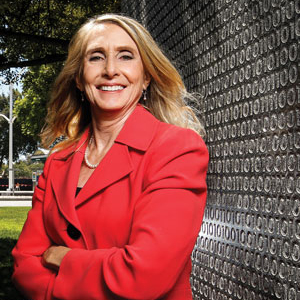Why are legal operations pros important to corporate law departments?

Ari Kaplan.
Ari Kaplan speaks with Connie Brenton, chief of staff and director of legal operations at NetApp, and president and chairman of the board of the Corporate Legal Operations Consortium.
She is joined by fellow leadership members Mary O’Carroll, head of legal operations at Google, Jeff Franke, assistant general counsel of global legal operations at Yahoo, and Chris Coats, vice president of legal operations at Oracle.
This Q&A has been condensed.
Ari Kaplan: Tell us about the genesis of the Corporate Legal Operations Consortium.
Connie Brenton: At the beginning of 2016, we created a nonprofit organization to bring together a community of legal operations professionals to share best practices, to advance the role of legal operations, to share information on technology, to network, and also to embrace the legal ecosystem. We realized that if we operate in silos, we come up with solutions that don’t work, and we’re very interested in having law firms, technology providers, universities, in-house executives, and regulators all in one room together sharing best practices and creating solutions collaboratively.
Ari Kaplan: Why has legal operations become so important in law department management?
Mary O’Carroll: Because of the changing times, the changing role of the general counsel in a legal department, and the need to run that department more like a business. There’s a lot more pressure coming in from the top for a general counsel to look at that department as a business, and because he or she is pulled in a lot of other directions, he or she needs to hire someone to handle the management of the financial issues, outside counsel and vendors, the knowledge, the systems and tools in IT, and any internal processes.
Ari Kaplan: What is unique about the role of a legal operations leader?
Chris Coats: The role of the legal operations leader is to be the right hand to the GC. You have to have the technological knowledge of what the legal team needs, be a negotiator, and take all the legal data and Big Data, analyze it and put it into metrics so that your GC can actually make business decisions, which are very different from the legal decisions they make every day.

Connie Brenton, chief of staff and director of legal operations at NetApp. ABA Journal file photo by Tony Avelar.
Connie Brenton: This is one of the most common questions that we as operations executives get. In response, we have created a standard definition and one can find our 12 core competencies at CLOC.org. It’s a complicated role geared around change management, and that’s a challenge particularly for a legal department, where the personality type is skeptical and resistant to change.
Ari Kaplan: Was there something in particular that changed in the market in 2016, the year that you formalized the Corporate Legal Operations Consortium?
Mary O’Carroll: Each month when we met, we found that that room was getting more full, and the number of people dialing in on the phone was growing. We discovered that there was absolutely a need for this kind of forum in the industry and that there was a need that wasn’t being met. I think we’ve seen that prove itself out with the fact that our first Institute, which we put together in 12 weeks with no marketing and no experience, had 500 attendees, and our membership grew to something like 600 in just 12 months.
Ari Kaplan: The Corporate Legal Operations Consortium is holding its second annual conference May 9th through the 11th in Las Vegas. What can attendees expect this year?
Jeff Franke: This industry has been in a state of evolution for quite a while. As the role of the GC has expanded and become much more focused on supporting the CEO, C-suite staff and the board, this role has assumed more and more responsibility, and the industry has started to change and evolve as well. Whereas last year, our conference was a foundational event, with a lot of sessions designed specifically towards what I like to refer to as “bringing order to chaos,” this year we’ll be building further on our 12 core competencies. We had approximately 60 sessions in 2016, this year we’ll be somewhere between 70 and 80. We’ve got what I characterize as a bit of a centerpiece session, and the goal is really to start refining the conversation around how we change the way legal departments within corporations do business. What are the different expectations we have from law schools? What are the different expectations we have from law firms, as well as from regulators? We’re going to expand the conversation.
Ari Kaplan: How do you see CLOC evolving?

Mary Shen O’Carroll. ABA Journal file photo by Tony Avelar
Mary O’Carroll: In the last year, we’ve grown to hundreds of members in every possible industry that’s out there, in companies that are large and small, in legal departments that have 1,000 people to those that have five. And, it’s grown in its reach to be much more international now. We have regional groups that have exploded and we can barely keep up with the demand for starting them, which are all over the United States, as well as in Australia and the UK. I think we’re going to see a lot more of this. We have a lot of initiatives going, which are cross-industry. We’re share best practices and setting standards.
Ari Kaplan: Where do you see legal operations headed?
Connie Brenton: Legal operations has already fundamentally changed how we purchase legal services. Legal operations centralizes spending and, as a result, it fundamentally changes how the business operates, both in-house and externally. We are working differently. We are no longer working faster and cheaper; we are working with different types of resources in different ways.
Listen to the complete interview at Reinventing Professionals.
Ari Kaplan regularly interviews leaders in the legal industry and in the broader professional services community to share perspective, highlight transformative change and introduce new technology.



